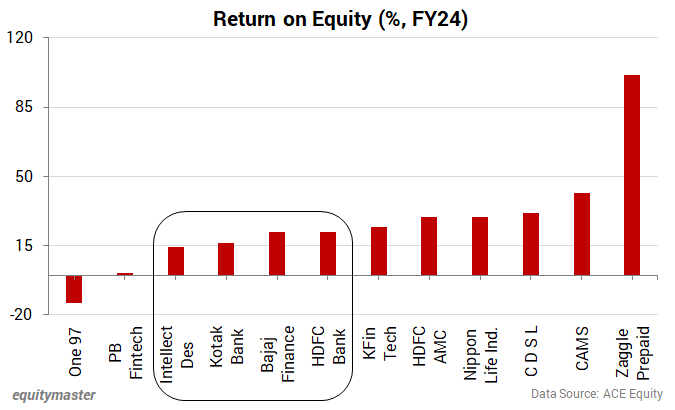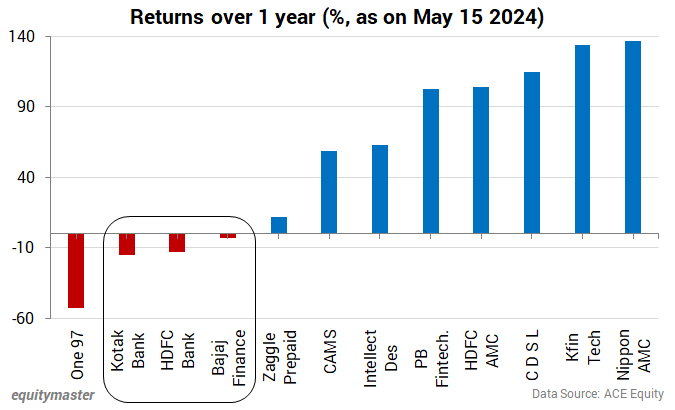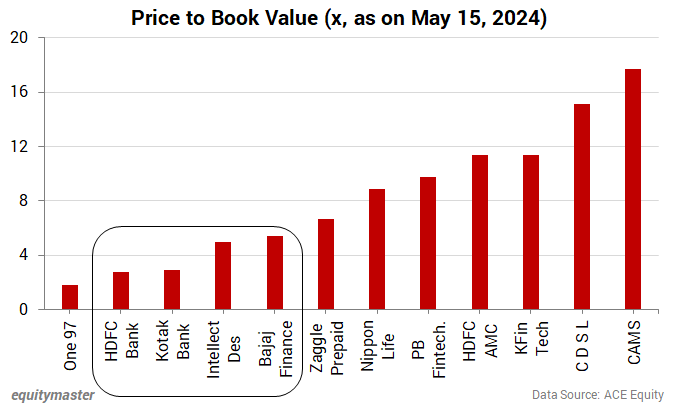What are the Best Fintech Stocks in the Market?

May 31, 2024
Norges Bank Investment Management (NBIM) is the single largest institutional investor in the global stock markets. Owned by Norway’s central bank, the entity manages the Norwegian Government Pension Fund.
NBIM owns 1.4% of entire global equity markets free-float through holdings in about 9,000 companies. Equities are only 70% of the fund’s portfolio. Total assets are over Rs 115 trillion.
Even the assets under management of largest Ameriis funds like BlackRock and Vanguard’s total (at about US$ 10 trillion each) are a fraction of NBIM’s.
When the Norwegians discovered oil, they decided to buffer the government expenditure from the inevitable volatility of oil prices by putting much of the oil proceeds into this fund.
What makes the fund unique is not just its size but also that it has done better than the index over a quarter of a century!
But it is not high-risk assets or some proprietary investing technique that has allowed the fund to stand tall over peers.
It’s the discipline in managing the fund and tight control on costs and withdrawals that has allowed the fund to compound handsomely over the decades. The fund’s motto to safeguard wealth for future generations acts as a yardstick for prudence.
The reason I’m referring to this is to reflect on the nature of financial entities that have outperformed, for decades, notwithstanding their size.
It’s the culture and prudence that has allowed even the largest banks and financial entities to outdo more nimble and aggressive peers.
Let me put this in context of India’s current fintech ecosystem. India’s financial sector is on the threshold of digital transformation.
— Advertisement —
Investment in securities market are subject to market risks. Read all the related documents carefully before investing
Indirect Path to Riding EV Opportunity
EV is an emerging opportunity of this decade.
And most investors think the best way to ride this opportunity is through stocks of EV making companies.
Well, our research suggests that’s not a recommended strategy.
Click Here
Details of our SEBI Research Analyst registration are mentioned on our website – www.equitymaster.com
———————————————
Thanks to India’s digital stack (Jandhan – Aadhaar – Mobile), the Unified Payments Interface (UPI) now facilitates transactions seamlessly and instantaneously across bank accounts.
As of December 2023, UPI transaction value crossed Rs 180 trillion, more than 50% of Indian GDP!
The rapid spread of a low cost, easy-to-use digital payments system transformed many small non-banking firms and made them part of the fintech ecosystem.
Over the last few years, many new age fintech entities got listed. Markets have awarded them significantly higher valuations compared to the incumbent banks.
This is mainly because these are fintech companies and their scope of growth are perceived differently to traditional banks.
Indian fintech companies are believed to address some critical bottlenecks. Compared to the traditional banks, they could increase outreach, improve customer experience, reduce operational friction, and foster usage of the digital channels.
Not being burdened with legacy operations, IT systems, and expensive physical networks, benefits of leaner operating models can be passed on to customers.
Legacy processes and higher operating cost models of incumbent banks give new age fintech companies an edge. The large banks will have to play catch-up with tech endowed nimble and innovative start-ups.
The fintech industry is also expected to develop unique and innovative models of assessing risks.
Leveraging big data, machine learning, and alternative data to underwrite credit and develop credit scores for customers, with a limited credit history, will improve the penetration of financial services in India.
Fintech entities are, therefore, assumed to create a more diverse, secured, and stable financial services landscape. And in doing so, create more shareholder wealth.
— Advertisement —
Investment in securities market are subject to market risks. Read all the related documents carefully before investing
Choose Your Pick
Unnecessarily Risky Small Caps vs Small Caps Brimming with Opportunity
Discover the Small Cap Strategy Thousands of Equitymaster Subscribers Use
I’m Interested
Details of our SEBI Research Analyst registration are mentioned on our website – www.equitymaster.com
———————————————
The niche business model of fintech firms could determine if the business is profitable or not. While there are several fintech firms in Inda with very high shareholder return ratios, there are also those in losses or barely breaking even.
Meanwhile, banks like Kotak Mahindra Bank, HDFC Bank and a NBFC like Bajaj Finance are not too behind when it comes to the Return on Equity.

Of course, the RBI penalised these large entities over the past few quarters due to their technical snags and fault lines in their risk mitigation systems.
The central bank is concerned that poor technical infrastructure could expose the customers of these banks to massive risks. And rightly so, as these banks are among India’s systemically important financial institutions.
Discover: How to Grow Your Wealth in a Stress-Free Way
Such concerns have kept investors away from the stocks of these leading banks and NBFCs. The poor performance of these stocks over the past year points to…
- Investors do not perceive them as fintech players.
- Their long standing ability to sustain credit quality, lend profitably and compound shareholder wealth is completely ignored.

But the fact is that both HDFC Bank and Kotak Bank have been allocating nearly 7% of operation costs to technology over past few years.
For Bajaj Finance, spending on tech processes has been in its DNA. Complying with RBI norms in recent times has also forced these entities to adopt tech enabled risk management systems.
In other words, these are the hidden fintech players in India’s financial sector, getting valued at a deep discount compared to their peers.

It’s a matter of time before investors realise the long-standing wealth creating ability of these entities like that of Norway’s NBIM.
Warm regards,

Tanushree Banerjee
Editor, StockSelect
Equitymaster Agora Research Private Limited (Research Analyst)



